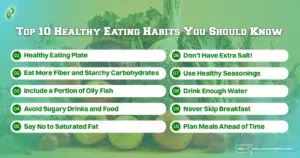
Last Updated on November 19, 2024 by Helena Akter
A common misconception is that “you need to eat less to be healthy,” which is dangerously wrong. You can eat all your favourite dishes and live a healthy life by following a few eating habits!
Some of the most effective healthy eating habits include eating foods rich in fiber and starchy carbohydrates, avoiding sugar and saturated fat, and staying hydrated and active! You should also make sure that you eat your meals on time and in proper portions.
Eating healthy is easy if you know some tips and tricks. Keep reading to find out the top 10 healthy eating habits that can change your life!
Factors of Healthy Eating Habits
Your eating habits can be influenced by a number of factors, including biological, cultural, psychological, etc. Let’s look at the things that shape your everyday food habits —
Biological
Hunger, appetite, and taste preferences all play a role in what we find appealing and how much we eat. Genetics can also influence our vulnerability to certain dietary issues.
The research found that neurobiochemical and psychological factors can contribute to eating disorders too.

Psychological
Mood, stress levels, and emotional eating can impact our food choices. We might crave comfort food if we’re stressed. Besides stress-eating, we can also struggle to make healthy decisions when we’re overwhelmed.
Well, you can tackle such psychological issues by practicing mindfulness exercises for anxiety.
Economic Factors
Healthy produce and whole-grain foods are often more expensive than processed foods. So, if you’re short on budget, it may limit your access to healthy items.
Environmental Factors
Your eating habits also depend on whether healthy food options are available and accessible to you. This includes access to grocery stores, farmers’ markets, and affordable healthy restaurants.
Social & Cultural Factors
Cultural traditions, family food habits, and social pressures from peers or family can influence our food choices.
While these factors influence our eating habits, we ultimately have the power to make conscious choices about the foods we consume.
Top 10 Healthy Eating Habits You Should Know
Building these eating habits takes time and commitment. But we have a list of easy tips you can follow to improve your food habits and live a healthier life —

1. Healthy Eating Plate
The plate model can help you eat healthier at every meal. Imagine your plate is divided into three sections and fill it up with healthy portions. Make vegetables and fruits the stars of your meal, filling half your plate.
Instead of refined grains, fill a quarter of your plate with whole grains like brown rice, quinoa, and whole-wheat bread. The other quarter should be filled with lean protein sources like fish, poultry, beans, and nuts.
2. Eat More Fiber and Starchy Carbohydrates
Ditch the refined carbs! High-fiber options like whole grains and veggies keep you fuller for longer. They slow down sugar release, giving you steady energy and preventing crashes.
Meanwhile, fiber acts as a prebiotic, feeding the good bacteria in your gut.
Also, opt for smart carbs like potatoes, sweet potatoes, corn, and peas. These vegetables contain complex carbohydrates, fiber, vitamins, and minerals. Plus, replace white bread, rice, and pasta with whole-grain alternatives.
While high-fiber and starchy carbohydrates are important, don’t neglect other food groups. Pair them with lean protein and healthy fats for a complete and nourishing meal.
3. Include a Portion of Oily Fish
Remember, “low-fat” doesn’t always mean healthy, so prioritize quality over quantity. Fish is a lean and complete source of protein. It builds and repairs tissues, supports muscle function, and keeps you feeling fuller for longer.
Oily fish like salmon, sardines, mackerel, and tuna are rich in omega-3 fatty acids. They can help lower bad cholesterol (LDL) levels and raise good cholesterol (HDL) levels. This reduces the risk of heart disease, stroke, and high blood pressure.
You can try out healthy salmon recipes for quick and easy meals!
4. Avoid Sugary Drinks and Food
Ditch the sodas, juices with added sugars, and sports drinks. Make healthy lemonades and fresh juices out of seasonal fruits.
For a touch of flavour, add slices of lemon, cucumber, or berries to your water. Unsweetened herbal teas are another refreshing option.
If you crave a touch of sweetness, opt for natural alternatives like fruits, dates, or a drizzle of honey. Remember, too much sugar can contribute to weight gain, diabetes, heart disease, and even dental problems.
5. Say No to Saturated Fat
While saturated fat is necessary for hormone production and cell function, too much of it can be harmful. Consuming excess saturated fat can raise your LDL cholesterol levels, which increases the risk of heart disease.
The American Heart Association suggests keeping your saturated fat intake to less than 6% of your daily calories. For someone on a 2,000-calorie diet, this means no more than about 13 grams of saturated fat per day.

Instead, focus on unsaturated fats, which are found in foods like olive oil, avocados, nuts, and seeds. These fats are heart-healthy and can help lower your LDL cholesterol.
Try to incorporate more unsaturated fats into your diet and keep saturated fat to a minimum.
6. Don’t Have Extra Salt!
Salt plays a crucial role in nerve and muscle function. But beware of extra salt! This can contribute to high blood pressure, a significant risk factor for heart disease, stroke, and kidney problems.
The American Heart Association recommends limiting sodium intake to less than 2,300 milligrams per day. To be on the safer side, go for 1,500 mg for optimal health. Read food labels carefully and pay attention to the sodium content per serving.
7. Use Healthy Seasonings
Instead of using extra salt or artificial seasoning in your food, go for natural and healthy ones. Explore various herbs and spices to create delicious flavor profiles without relying on salt.
Experiment with garlic powder, onion powder, paprika, chili powder, turmeric, cumin, and countless others. Fresh herbs like basil, oregano, rosemary, and thyme add another layer of flavor dimension.
A squeeze of fresh lemon or lime juice can brighten up your dishes and add a touch of acidity. Vinegar like balsamic, red wine, or apple cider vinegar can add a tangy touch and enhance savory flavors.
8. Drink Enough Water
Whether you’re a gym enthusiast or simply enjoy an active lifestyle, proper hydration is important.
Water helps regulate body temperature during exercise. It also prevents muscle cramps and keeps the body functioning at its fullest.
Drinking water can help you feel fuller for longer. So, it reduces calorie intake and helps in weight management efforts. Dehydration can lead to constipation and other digestive issues.
Find out about the impacts of dehydration!
9. Never Skip Breakfast
The saying “breakfast is the most important meal of the day” holds significant truth.
Breakfast acts like a switch, jumpstarting your metabolism after a night’s sleep. This helps regulate blood sugar levels throughout the day. So, you can prevent energy crashes and cravings.
Studies have shown that eating breakfast can improve cognitive function, memory, and alertness. A balanced breakfast is a great opportunity to incorporate key nutrients into your diet.

10. Plan Meals Ahead of Time
Planning reduces the need for daily grocery store trips and impulse buys. With a plan in place, you can create a targeted grocery list. This reduces food waste and saves money.
When you have the time to plan, you can also include healthier food. You have time to incorporate a variety of fruits, vegetables, and whole grains to ensure a balanced and nutritious diet.
Remember, healthy eating is a journey, not a destination. Developing healthy eating habits takes time, and you won’t see the results right away. There are many other healthy habits that you can follow to achieve a better lifestyle.
Be patient and practice a healthier life!
Final Words of Healthy Eating Habits
Building a healthy relationship with food is a journey. In addition to the tips we’ve mentioned, there are many other steps to developing healthy eating habits.
Avoid sugary foods or dishes that contain saturated fat. Plan your meals and include high-fiber and starchy carbohydrates. You must also stay hydrated throughout the day to prevent health concerns.
Remember, home-cooked meals are the way to go!
, vitamins, and minerals. Replace white bread, rice, and pasta with whole-grain alternatives.
While high-fiber and starchy carbohydrates are important, don’t neglect other food groups. Pair them with lean protein and healthy fats for a complete and nourishing meal







